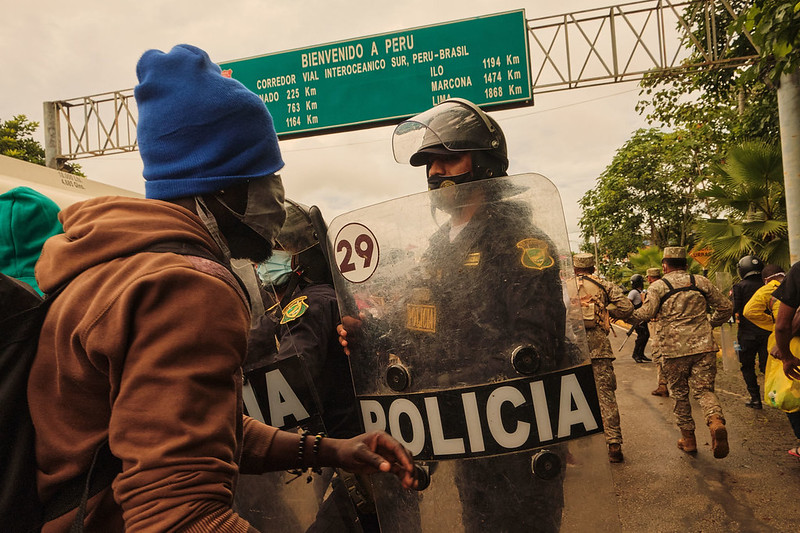Facebook
Twitter
Pinterest
WhatsApp
Email
Conflict between police and migrants at the Peruvian border in 2021. How would well-armed but poorly trained police forces react in such a situation? Photo: Alexandre Cruz Noronha/Amazônia Real via Flickr (CC BY-NC 2.0)
(Lima, 1. August 2023, latin press).- Criticism of the creation of a new police unit with former members of the armed forces in Peru is growing, despite the government’s efforts to gain acceptance for the project.
Prime Minister Alberto Otárola and Interior Minister Vicente Romero explained how the gap of 40,000 to 50,000 police officers will be filled by young people who have completed their voluntary military service and will receive six months of training. Nevertheless, objections to the plans are increasing.
Despite warnings from security experts, Romero reiterated that the tender for ex-soldiers will be launched as soon as Parliament passes the law. He assured that members of the new police force would only take on crime prevention duties such as robbery, theft and vandalism.
Unqualified vigilante feared
On the other hand, former deputy minister for public security, Ricardo Valdés, criticized the government for trying to create a kind of municipal vigilante group, equipped with weapons, patrol cars and motorcycles, and with the power to pursue suspected criminals and kill them if necessary.
On the extreme right, former Interior Minister Fernando Rospigliosi described the project announced by President Dina Boluarte at the end of July as catastrophic and fateful. It could make the situation a lot worse. He added that the bill would allow even those who could not qualify for the existing police academy to join the new police force.
For Stefano Miranda, a lawyer specializing in police affairs, the bill is unconstitutional and an idea “of people who want to experiment with the national police and their functions”. It is “a populist draft, in no way serious or professional”. He thinks it is risky to use non-professional police officers because “we would not be able to have cases of corruption in all Latin American countries. There are minor everyday cases of corruption such as police checks. But important politicians, public prosecutors and judges are also repeatedly involved in crimes such as drug trafficking. The unpunished corruption of people in positions of power is particularly problematic, as it keeps the population disenchanted with politics.
” href=” data-gt-translate-attributes=”[{“attribute=””>controlcorruptionandwrongdoing”[{“attribute=””>KorruptionundFehlverhaltenzukontrollieren“
For the lawyer César Bazán, the bill is misleading. Because he pretends to increase the number of police officers, but “at the expense of quality and professionalism”. To make matters worse, the officials are to be equipped with weapons.
Former interior ministers Carlos Morán, former police general, and Rubén Vargas thought the idea acceptable. However, the former said that the project should be discussed. The latter explained that caution should be exercised when selecting and preparing new police officers. Vargas warned that handing over police uniforms and firearms to undertrained police officers “would be a time bomb.”
